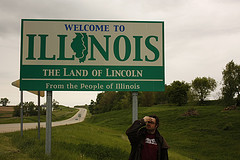Illinois Sues Company For Breaking Into Homes To Evict Homeowners Facing Foreclosure
Additionally, the lawsuit [PDF], filed by Illinois AG Lisa Madigan in Cook County Circuit Court alleges that the company, Safeguard Properties, was shutting off homeowners’ utilities well before foreclosures were finalized and removed personal property.
Even if a homeowner in Illinois has completely stopped making payments on his mortgage, he has a legal right to stay in the home until the foreclosure process is complete. Likewise, rental tenants in buildings facing foreclosure have the right to remain until after the foreclosure, and even then the lender or new owner must still go through the process of legally evicting the tenant.
“Despite these legal protections,” reads the complaint, “Safeguard has ignored and severely curtailed the rights of occupants of at-risk properties, properties in foreclosure, and REO [bank-owned] properties by illegally breaking into homes, removing occupants’ personal property, locking out occupants, turning off utilities for legally occupied property, refusing to allow re-entry into these properties, and making coercive and deceptive representations to legal occupants.”
The suit gives examples of Safeguard’s alleged bad behavior.
There’s the homeowner who, while still trying to get a mortgage modification from his loan servicer, received notice in July 2011 that the servicer was beginning foreclosure actions against him.
The man was still legally residing in the home in Aug. 2012 when a Safeguard subcontractor posted a notice on his door that the building had been deemed vacant. Even though he contacted Safeguard immediately to alert the company to the fact that he was still in the building, the subcontractor continued posting these vacancy notices — a dozen of them in only four months.
Then in Dec. 2012, Safeguard — in spite of having been told more than a dozen times that the building was still legally occupied — told the subcontractor to secure the property. This entailed using a sledgehammer to knock down the door.
Once inside the property, the subcontractor realized someone was still living there and thus left without securing the home — and without replacing the door that had just been knocked down.
It took more than two weeks for Safeguard to finally get around to repairing the door.
The complaint contains several other examples, like the Armed Forces servicemember who was in the process of a short sale on his property when he returned home from mandatory training to find his home had been broken into, the locks changed and utilities shut off. Another homeowner, who had fallen behind on her payments but had not entered default, returned home to find it had been broke into, the locks changed, her water shut off and anti-freeze poured into her pipes to winterize the property.
“This case shows the lengths that banks and their service providers will go to abuse and intimidate borrowers in foreclosure,” Madigan said in a statement. “This company was illegally breaking in to people’s homes, removing all their possessions and locking them out. It is a homeowner’s worst nightmare.”
Want more consumer news? Visit our parent organization, Consumer Reports, for the latest on scams, recalls, and other consumer issues.


